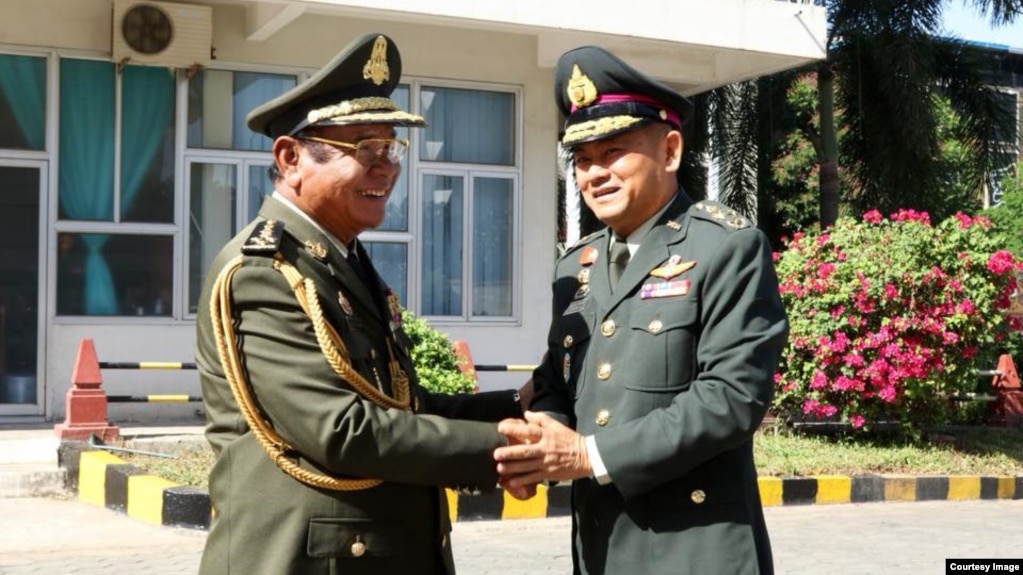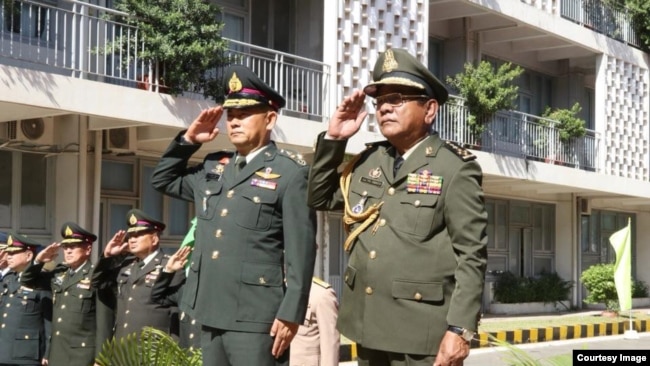25 June 2018
Aun Chhengpor
VOA Khmer

General Pol Saroeun, commander-in-chief of the Royal Cambodian Armed Forces, left, shakes hands with General Thanchaiyan Srisuwa, chief of defense forces of the Royal Thai Armed Forces, right, in Phnom Penh, Cambodia, June 22, 2018. (Courtesy of Gen. Pol Saroeun's Facebook page)
General Thanchaiyan Srisuwa was appointed to the position in September and this was his first official visit to Cambodia since assuming the role.
PHNOM PENH —
Enhancing cross-border security topped the agenda at a meeting between high ranking military officials from Cambodia and Thailand last week.
Gen. Pol Saroeun, the Cambodian commander-in-chief, met with Gen. Thanchaiyan Srisuwan, head of the Thai military, on Friday at the Royal Cambodian Armed Forces headquarters in Phnom Penh.
Saroeun is due to step down from his position shortly to contest a seat in the general election in late July.
Gen. Sao Sokha, the military police chief who will assume Saroeun’s position during the election period, was also in attendance.
Srisuwan was appointed to the position in September and this was his first official visit to Cambodia since assuming the role.
“The purpose of this visit is to further strengthen the friendship, solidarity, and cooperation between the governments, the militaries, and people of the two countries,” Saroeun said in a statement.
Chhum Socheat, a defense spokesman, said the duo had discussed ways to combat “non-traditional security threats”, including human trafficking, drug trafficking, and terrorism.
Srisuwan later discussed similar topics in a meeting with Prime Minister Hun Sen, he added.
This year marks the ten-year anniversary of the start of a conflict between Cambodia and Thailand over the protected Preah Vihear Temple on the northernmost border between the two countries, which lasted until 2011.
Hun Sen has maintained a strong personal relationship with the family of Thaksin Shinawatra, the former Thai prime minister, but has made efforts to cultivate closer relations with the military junta since it took power in a coup in 2014.

General Thanchaiyan Srisuwa, chief of defense forces of the Royal Thai Armed Forces, left, and General Pol Saroeun, commander-in-chief of the Royal Cambodian Armed Forces, right, are pictured saluting in Phnom Penh, Cambodia, June 22, 2018. (Courtesy of Gen. Pol Saroeun's Facebook page)
Lao Mong Hay, a veteran political analyst, said economic pragmatism had pushed Bangkok and Phnom Penh closer together and meant that Hun Sen’s personal ties to the Shinawatra family had taken a back seat.
“The economic ties are not balanced, though, since Thailand has benefited from the employment of Cambodian workers in its manufacturing industries and has gained from exporting goods to Cambodia,” he said.
Deth Sok Udom, an associate professor of international relations at Zaman University who has studied Thailand-Cambodia relations, said Srisuwan’s visit reflected a general trend towards shared interest between the two countries.
“With mutual economic interests and political legitimacy at stake, it looks plausible that the Cambodian government and its [Thai] military counterpart will continue to cooperate on most aspects and avoid highly sensitive issues -- such as the Preah Vihear conflict -- that may jeopardize the two countries’ relationship in the immediate run," he added
“The recent visit by General Srisuwan confirms this general trend. We can also say that unlike in the Cold War when the two neighbors were drawn to different power blocs, the situation today is different in the sense that both Cambodia and Thailand are fellow Asean members, have friendly ties with a rising China, and sometimes an uneasy relationship with the US over the issues of human rights and electoral democracy.”

No comments:
Post a Comment